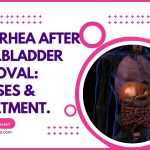Gurgling Stomach and Diarrhea for a Week: 7 Causes & Treatments.
Our content is not intended nor recommended as a substitute for medical advice by your doctor. Use for informational purposes only.
Possible causes of gurgling stomach and diarrhea include:
- Stomach flu (viral gastroenteritis) and other types of acute gastroenteritis.
- Stress or anxiety attack.
- Food intolerance or allergy attack.
- Recent use of a drug such as antibiotics, metformin, and laxatives.
- Premenstrual syndrome.
- An IBS attack.
1- Viral gastroenteritis (Stomach flu).
Viral gastroenteritis is the most common cause of your GI tract acute infection. Approximately 60% of the cases of acute diarrhea are due to viruses (reference).
The most common viruses that can cause stomach gurgling and diarrhea are:
- Norovirus.
- Rotavirus (less prevalent nowadays because of the immunization programs in the US).
- Astrovirus.
- Adenovirus
The symptoms of viral gastroenteritis (stomach flu) usually last between 1 and 4 days. But it can cause stomach gurgling and diarrhea for a week.
Symptoms:
- Sudden onset of diarrhea and abdominal cramps.
- Stomach gurgling and noises.
- Nausea and vomiting can also occur.
- Fever (low-grade) may also present.
- Loss of appetite (anorexia).
- Headache, fatigue, and muscle aches can also be present.
Treatment:
Usually, the condition is mild and self-limiting in adults. But prolonged symptoms such as a complete week of diarrhea and stomach gurgling may necessitate consulting your doctor or nurse.
- Eat bland foods such as the BRAT diet (Bananas, Rice, Applesauce, and Toast).
- Stay hydrated (drink plenty of fluid, but avoid alcohol and caffeine).
- Avoid fats, high-sugar, and dairy products as much as possible.
- Eat frequent small meals.
- See a doctor if the symptoms are not going away or if you have frequent vomiting, fever, or dehydration.
2- Other types of gastroenteritis and food poisoning.
Other types of gastroenteritis include:
- Giardiasis (a protozoan that causes acute gastroenteritis with yellow diarrhea).
- Bacteria include salmonella, campylobacter, shigella (bacillary dysentery), and E. coli.
- Other protozoal infections such as entamoeba, cryptosporidium, and others.
When the cause is bacterial, the symptoms are usually more severe with:
- More severe attacks of diarrhea.
- Fever is usually high-grade.
- Bloody diarrhea and dysentery can also occur.
The below table summarizes the differences between viral and bacterial gastroenteritis.
| Type | Viral Gastroenteritis | Bacterial gastroenteritis |
| 1- Site | Usually affects the stomach and small intestine. | Affects the colon. |
| 2- Diarrhea. | Watery, mild | bloody, mucoid, more severe. |
| 3-Vomiting | usually present | rarely occur. |
| 4- Cramps | mild | severe |
| 5- Fever | low grade | high grade |
| 6- Anorexia | mild or not present | severe. |
Call your doctor if you are experiencing severe symptoms such as high-grade fever, persistent vomiting, or bloody diarrhea.
3- Stress or anxiety conditions.
Periods of stress or anxiety can greatly affect your digestion. Your gut is closely linked to your brain and your mental state.
Anxiety and chronic stress are some of the most accepted theories of irritable bowel syndrome.
One study estimated that anxiety prevalence is about 44% among people with IBS compared to 8% in the general population.
Stressful life events or flares of anxiety can lead to digestive symptoms such as stomach gurgling and diarrhea for a week or so.
For example, you progressively feel unwell during exam periods as the exam time becomes close.
Stress can alter motility and fluid secretion and even affect your digestive tract’s microbiota.
Try to stay away from stress or get help if you notice a link between stress and stomach gurgling with diarrhea.
Relaxation techniques, talking to a friend, and acting toward what is stressing you will help you overcome the stress.
4- Food intolerance or allergy.
Food intolerance is very common. Too many people have a reaction to certain foods in the form of stomach gurgling, diarrhea, bloating, and nausea.
Food intolerance is different from food allergy. Food intolerance symptoms are usually purely digestive. At the same time, food allergy symptoms can manifest with more severe signs and have extraintestinal symptoms such as skin hives and respiratory symptoms.
The differences and the most common types of food intolerance and allergy are illustrated in the below table:
| Food intolerance | Food allergy |
| Affects 15-20% of the population | Affects nearly 2-5% of adults |
| Difficulty digesting certain types of food (not immune-mediated allergy). | An immune-mediated reaction to certain foods or food components. |
| Causes “recurrent acute” or “chronic” attacks of diarrhea | Usually causes acute attacks related to the ingestion of offending food. |
| Intestinal symptoms: diarrhea, extensive gas, bloating, abdominal pain, stomach gurgling | Intestinal symptoms are the same |
| No extraintestinal symptoms | Extraintestinal symptoms like rashes, urticaria, swollen lips or face, or severe life-threatening allergic reactions. |
| The severity of your symptoms is proportional to the amount you eat from the offending food. | Even trace amounts of the offending food can produce severe symptoms. |
Common offending foods:
| Common offending foods: (examples)
|
5- Recent use of antibiotics or other medications.
“Did I recently take any medication before the onset of such symptoms?”. This is one vital question to ask yourself if you have had stomach gurgling and diarrhea for a week.
Too many medications can result in stomach gurgling, diarrhea, and other digestive symptoms.
Diarrhea alone can be caused by more than 700 drugs (reference). The symptoms can range from mild stomach gurgling and mild diarrhea to severe bloody diarrhea (as with antibiotic-associated colitis).
Common medications that can cause stomach gurgling and diarrhea for a week:
- Recent use of antibiotics: Any antibiotic can kill the beneficial bacteria inside your colon.
- A recent change in the anti-diabetes medications: Metformin and gliptins (vildagliptin, sitagliptin, and others) can cause diarrhea and stomach gurgling.
- Laxative overuse.
- Stomach/GERD medications: PPIs (as omeprazole, esomeprazole, and pantoprazole) and H2 blocker inhibit stomach acid. This inhibition will allow for the overgrowth of bacteria inside the small intestine and colon, causing stomach gurgling and diarrhea.
- Others, such as chemotherapy and immunosuppressive medications, can also cause such conditions.
The complete list of medications causing diarrhea is HERE and HERE.
6- Premenstrual syndrome (PMS).
Premenstrual syndrome is a group of physical and psychological symptoms that occur repetitively in the last week of each menstrual cycle.
A wide variety of symptoms can occur, including (reference):
- Bloating, stomach gurgling, and diarrhea for a week before the menses.
- Irritability is the most common behavioral symptom of PMS.
- Change in appetite and food cravings.
- Extreme sense of fatigue.
- Breast pain.
- Sudden change in the mood.
- Feeling easily upset or on the edge.
- Trouble sleeping or working.
These symptoms are usually due to hormonal changes before the menses. For your doctor to diagnose you with PMS, He should first excuse psychological and thyroid diseases.
Options for the treatment of PMS:
- Trial of lifestyle changes such as regular exercise.
- Stress reduction techniques such as progressive relaxation, breathing exercises, or hypnotherapy.
- Cognitive-behavioral therapy (CBT).
- Selective Serotonin Reuptake Inhibitors (SSRIs) drugs.
- Hormonal treatments include combined estrogen-progesterone oral contraceptives (COCs) if the women need contraception.
7- An IBS attack.
Irritable bowel syndrome is one of the most common diseases worldwide. It affects about 10-15% of people worldwide (reference).
More importantly, only 40% of people matching the criteria of IBS have an official diagnosis. This leaves 60% of people with IBS not knowing that they have such a condition (reference).
Symptoms of IBS include:
- Abdominal pain (at least one day per week for the last three months).
- The onset of abdominal pain is associated with bowel movements (the pain either improves or worsens after a bowel movement).
- Change in stool form (the stool becomes harder or looser with the onset of pain).
- Change in stool frequency (diarrhea or constipation).
- Bloating and loss of appetite.
- Passage of mucus with stools.
- The disease continues in periods of flare-ups and remission.
- It is usually triggered by certain foods (Such as FODMAPs) or psychological stress.
- It can cause recurrent stomach gurgling and diarrhea for a week or more.
Read this detailed guide about how IBS is diagnosed. Arrange a doctor’s visit if you think your symptoms are consistent with IBS.
Treatment of IBS usually includes:
- Avoid gas-producing trigger foods such as FODMAPs.
- Eating smaller meals and being physically active.
- Avoid caffeine and alcohol.
- Antispasmodis (to treat abdominal colics).
- Symptomatic treatment of diarrhea or constipation with antidiarrheals (such as loperamide) or laxatives for constipation.
- Some over-the-counter medications and probiotics can also help, such as Peppermint oil capsules, Metamucil (psyllium), and others.
When to see a doctor.
See a doctor for stomach gurgling and diarrhea for a week if the following symptoms occur:
- Severe abdominal pain (that can awaken you at night).
- Presence of blood in the stool.
- Recurrent vomiting.
- High-grade fever.
- Severe watery diarrhea for a week (with no obvious cause).
- Failure of home remedies to control the condition.
- Unexplained weight loss or sense of mass in the abdomen.
- Recent intake or change of medications.
MORE:
- Flatulence and Mucus Discharge: 7 Causes Explained.
- Indigestion & Diarrhea: 9 Common Causes (Acute & Chronic).
- Evidence-based
- Written by a doctor.






